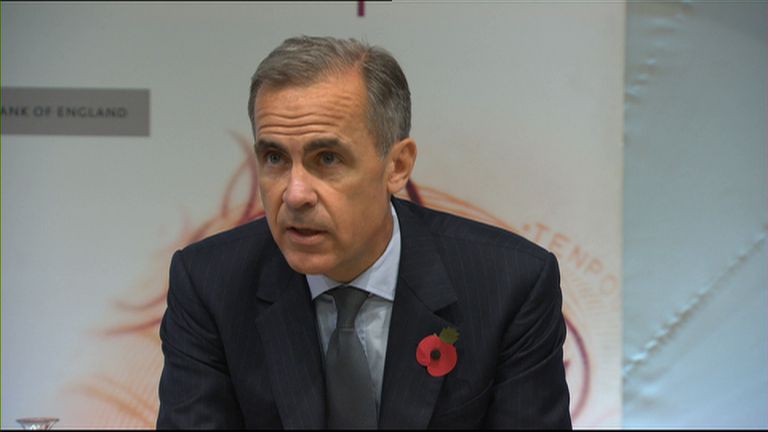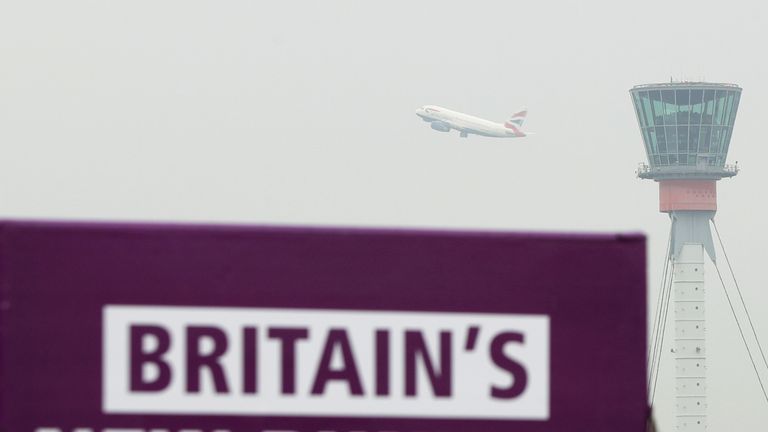Up to £15bn to be spent on 'future-proofing' economy against Brexit
The Chancellor plans to invest billions on building ready-to-go projects in an attempt to stimulate local areas ahead of Brexit.
Tuesday 15 November 2016 11:57, UK
Philip Hammond is planning to invest up to £15bn into Britain's creaking transport network and hi-tech industries in an attempt to "future-proof" the economy from the turbulence of Brexit.
The Chancellor will back dozens of small-scale infrastructure projects across the UK to get shovel-ready road and rail links off the ground.
Sky News understands Mr Hammond has earmarked several billion for various schemes - and could spend up to £15bn on infrastructure overall - as he looks for boosts to economic growth.
While Mr Hammond is still supportive of his predecessor's big ticket projects, such as HS2 and the Hinkley Point power station, the focus in his Autumn Statement will be on projects that are ready to go and can stimulate local areas in the next couple of years as Britain prepares for Brexit.
"Forget about the political ambition of George Osborne, (Hammond) is about practical ambition - trying to future proof the economy," said one figure familiar with his plans.
Mr Hammond also wants his infrastructure package to boost British productivity: better road and rail links should help to get people to work more quickly, while investment into the technology and science sectors should help create more highly skilled and better-paid jobs.
Despite high employment levels in the UK, productivity remains stubbornly low: on average, UK workers produce 35% less per hour than their German counterparts.
Economists suggest part of the UK's problem was the growth in low-paid, low-skilled jobs in the wake of the financial crisis.
Improving productivity is central to Theresa May's pledge to raise living standards for British workers because it makes it easier for employers to lift workers' wages as they get more bang for their buck from employees.
The Confederation of British Industry (CBI), which represents Britain's biggest businesses, has called on the Chancellor to invest £6bn into local housing, transport and hospital schemes in his Autumn Statement.
"We will see continued commitment to big infrastructure projects, we had decisions on Heathrow and HS2," the CBI's Rhian Kelly told Sky News.
"But I think that this Government also realises we need to do much more on a local level, particularly if it links to productivity and is outside London and the southeast."
One such scheme that could get the green light is the Stubbington bypass in Fareham. The 3.5km road is central to local plans to create 10,000 new jobs and 6,000 new homes in the area.
Local councillors have raised £8.5m for the new scheme and are asking the Chancellor for £25m to get the road up and running.
Caroline Dinenage, MP for Gosport, who has been lobbying the Chancellor to fund the scheme, said the new road was a "lifeline" that would ease 20,000 commuters out of traffic jams and also attract new jobs to the area.
Fareham Borough Council leader Sean Woodward, who has been working on the scheme for four years, said he hoped the new Chancellor would be more amenable to the project than his predecessor.
"I think George Osborne, as a very adept politician, has focused on his northern heartlands and big eye-catching schemes with eye-watering sums of money - but you can, for rather less money, open up areas like this (Fareham) enterprise zone and really create jobs as well. You can do a lot more for rather less."
Treasury sources declined to comment on whether the project would get the green light, but one source told Sky News the bypass had "many of the hallmarks of a high-priority project".
But the Government will too press ahead with those big ticket items, finally backing a third runway at Heathrow last month after years of prevaricating.
Meanwhile, the Government has set out its preferred route for the northern section of the £56bn HS2 project - announcing the routes for the two new lines from Crewe to Manchester and the West Midlands to Leeds.
Transport Secretary Chris Grayling said the line was a "game changer for the country" - slashing journey times and providing thousands more train seats between London and the North.
The Government estimates that the number of commuter and intercity trains on HS2 and the east and west coast main lines could almost double to 48 an hour by 2033.







